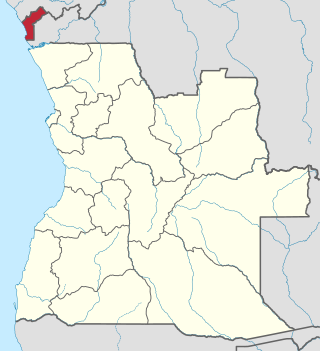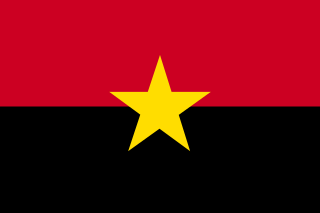Related Research Articles

Angola, officially the Republic of Angola, is a country on the west-central coast of Southern Africa. It is the second-largest Lusophone (Portuguese-speaking) country in both total area and population and is the seventh-largest country in Africa. It is bordered by Namibia to the south, the Democratic Republic of the Congo to the north, Zambia to the east, and the Atlantic Ocean to the west. Angola has an exclave province, the province of Cabinda, that borders the Republic of the Congo and the Democratic Republic of the Congo. The capital and most populous city is Luanda.

Angola was first settled by San hunter-gatherer societies before the northern domains came under the rule of Bantu states such as Kongo and Ndongo. In the 15th century, Portuguese colonists began trading, and a settlement was established at Luanda during the 16th century. Portugal annexed territories in the region which were ruled as a colony from 1655, and Angola was incorporated as an overseas province of Portugal in 1951. After the Angolan War of Independence, which ended in 1974 with an army mutiny and leftist coup in Lisbon, Angola achieved independence in 1975 through the Alvor Agreement. After independence, Angola entered a long period of civil war that lasted until 2002.

Cabinda is an exclave and province of Angola, a status that has been disputed by several political organizations in the territory. The capital city is also called Cabinda, known locally as Tchiowa, Tsiowa or Kiowa. The province is divided into four municipalities—Belize, Buco-Zau, Cabinda and Cacongo.

The People's Movement for the Liberation of Angola, from 1977–1990 called the People's Movement for the Liberation of Angola – Labour Party, is an Angolan social democratic political party. The MPLA fought against the Portuguese Army in the Angolan War of Independence from 1961 to 1974, and defeated the National Union for the Total Independence of Angola (UNITA) and the National Liberation Front of Angola (FNLA) in the Angolan Civil War. The party has ruled Angola since the country's independence from Portugal in 1975, being the de facto government throughout the civil war and continuing to rule afterwards.

António Agostinho Neto was an Angolan communist politician and poet. He served as the first president of Angola from 1975 to 1979, having led the Popular Movement for the Liberation of Angola (MPLA) in the war for independence (1961–1974). Until his death, he led the MPLA in the civil war (1975–2002). Known also for his literary activities, he is considered Angola's preeminent poet. His birthday is celebrated as National Heroes' Day, a public holiday in Angola.

The Angolan War of Independence, known as the Armed Struggle of National Liberation in Angola, was a war of independence fought between the Angolan nationalist forces of the MPLA, UNITA and FNLA, and Portugal. It began as an uprising by Angolans against the Portuguese imposition of forced cultivation of only cotton as a commodity crop. As the resistance spread against colonial authorities, multiple factions developed that struggled for control of Portugal's overseas province of Angola. There were three nationalist movements and also a separatist movement.

The Angolan Civil War was a civil war in Angola, beginning in 1975 and continuing, with interludes, until 2002. The war began immediately after Angola became independent from Portugal in November 1975. It was a power struggle between two former anti-colonial guerrilla movements, the communist People's Movement for the Liberation of Angola (MPLA) and the anti-communist National Union for the Total Independence of Angola (UNITA).
Party of the United Struggle for Africans in Angola is the first political party in Angola to advocate Angolan independence from Portugal, campaigning from its founding in 1953 until it merged with the Angolan Communist Party (PCA) to form the People's Movement for the Liberation of Angola (MPLA) in December 1956.
Angolan Communist Party was an underground political party in Portuguese Angola, founded in October 1955, under influence from the Portuguese Communist Party. PCA was led by the brothers Mário Pinto de Andrade and Joaquim Pinto de Andrade. PCA set up clandestine schools and libraries in Luanda, and established branches in Catete and Malanje.

The Republic of Cabinda was an independent protectorate of Portugal that was taken over by Angola after Portugal declared Angola a free country. It is currently an unrecognized state, which Angola considers its Cabinda Province property. The Front for the Liberation of the State of Cabinda-Exército de Cabinda (FLEC) claimed sovereignty just after the Republic of Cabinda was proclaimed as an independent country in 1975 from Portugal and just after Angola invaded. The government of this entity operates in exile, with offices located in Paris, France, and Pointe Noire, Republic of the Congo.
Viriato Clemente da Cruz was an Angolan poet and politician, who was born in Kikuvo, Porto Amboim, Portuguese Angola, and died in Beijing, People's Republic of China. He is considered one of the most important Angolan poets of his time. He wrote poems in Portuguese, some of which include phrases in the Angolan Bantu language of Kimbundu. He took part in the political struggle to free Angola from Portuguese rule.
The Alvor Agreement, signed on 15 January 1975 in Alvor, Portugal, granted Angola independence from Portugal on 11 November and formally ended the 13-year-long Angolan War of Independence.
The military history of Angola is marked by a series of conflicts rooted in tribal conflicts, colonialism and the Cold War. During the Cold War, Angola was involved in struggles between Western powers and South Africa with the help of the Soviet Union and Cuba.

Since its independence from Portugal in 1975, Angola has had three constitutions. The first came into force in 1975 as an "interim" measure; the second was approved in a 1992 referendum, and the third one was instituted in 2010.
The 1960s in Angola were marked by the War of Independence (1961–1975). Portuguese police arrested Agostinho Neto of the MPLA and future President of Angola (1975–1979) in 1960 for the third time. Delegates discussed Cabinda's self-determination in relation to Angola at the 4th Commission of the United Nations on Decolonization in New York in 1962. Cabinda became a member of the Organisation of African Unity (OAU) as the 39th colonized country in 1964.
The 1940s in Angola saw the emergence of the first separatist agitation in the province of Cabinda.
In the Angola–Cuba Declaration of 1984, signed 19 March 1984 in Havana by president José Eduardo dos Santos of Angola and Fidel Castro, premier of Cuba, the two countries agreed to the withdrawal of Cuban forces from Angola after the withdrawal of South African troops from Angola and Namibia, and after UN-Security Council resolution 435 on Namibian independence was strictly applied.

The People's Republic of Angola was the self-declared socialist state which governed Angola from its independence in 1975 until 25 August 1992, during the Angolan Civil War.

In southwestern Africa, Portuguese Angola was a historical colony of the Portuguese Empire (1575–1951), the overseas province Portuguese West Africa of Estado Novo Portugal (1951–1972), and the State of Angola of the Portuguese Empire (1972–1975). It became the independent People's Republic of Angola in 1975.

Deolinda Rodrigues Francisco de Almeida was an Angolan revolutionary, writer, and poet. She was a member of the Movimento Popular de Libertação de Angola and, in addition to seeing combat, worked for the organisation as a translator, educator, and radio host.
References
- ↑ Palmer, Alan Warwick (1979). The Facts on File Dictionary of 20th Century History, 1900-1978. p. 15.
- ↑ Dicken, Samuel Newton; Forrest Ralph Pitts (1963). Introduction to Human Geography. p. 359.
- ↑ Osmâanczyk, Edmund Jan; Anthony Mango (2003). Encyclopedia of the United Nations and International Agreements. p. 95.
- ↑ Wright, George (1997). The Destruction of a Nation: United States Policy Towards Angola Since 1945 . pp. 2, 8–11, and 57.
- ↑ Oyebade, Adebayo O (2006). Culture And Customs of Angola. pp. XI.
- ↑ Africa Year Book and Who's who. 1977. p. 238.
- ↑ Tvedten, Inge (1997). Angola: Struggle for Peace and Reconstruction . pp. 29–36.
- ↑ Shadle, Robert (ADP); James Stuart Olson (1991). Historical Dictionary of European Imperialism. pp. 26–27.
- ↑ Jessup, John E. (1998). An Encyclopedic Dictionary of Conflict and Conflict Resolution, 1945-1996. pp. 518–519.
- ↑ Wright, George (1997). The Destruction of a Nation: United States' Policy Towards Angola Since 1945 . pp. 3.
- ↑ Clark, Desmond J. (1975). The Cambridge History of Africa. p. 772.
- ↑ Angola Archived 2007-09-26 at the Wayback Machine Energy Information Administration
- ↑ Tvedten, Inge (1997). Angola: Struggle for Peace and Reconstruction . pp. 82.
- ↑ Bender, Gerald (1974). Whites in Angola on the Eve of Independence: The Politics of Numbers.
- ↑ Gann, Lewis Henry; Peter Duignan (1973). Colonialism in Africa, 1870-1960. p. 28.